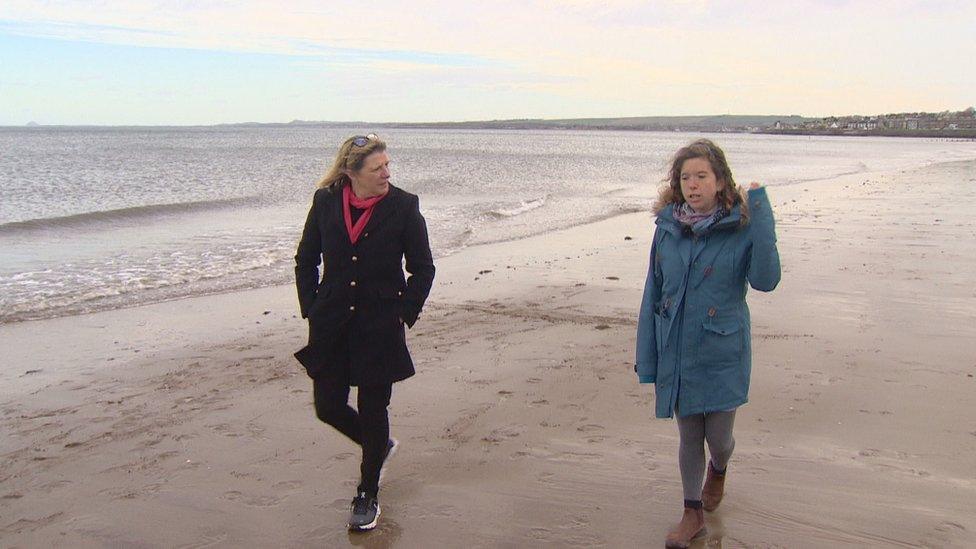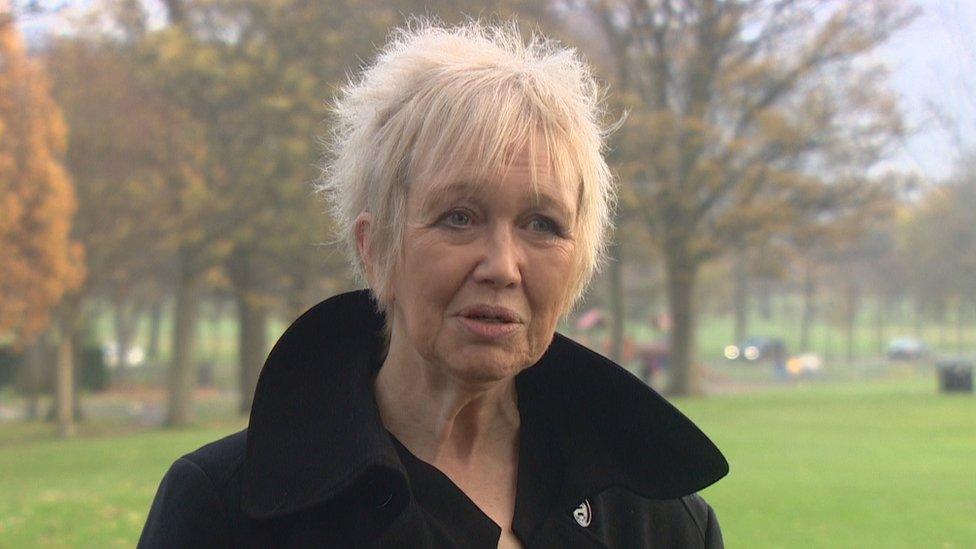Mental health: 'It was like queuing to go into a torture chamber'
- Published
Abigail Reynolds experienced panic attacks in supermarkets while trying to buy essentials during lockdown
A mother-of-two has described the mental health toll of fighting anorexia in a time of Covid.
Abigail Reynolds was discharged from hospital in February but lockdown threw her home recovery plans into chaos.
One expert believes about a third of the adult population is now displaying the kind of serious symptoms that could characterise a psychiatric illness.
The Royal College of Psychiatrists in Scotland (RCPsych) has warned of a "mental health emergency", with a recent survey suggesting four in 10 Scots believe they will experience mental health problems in the future.
The survey, which coincides with a new Choose Psychiatry recruitment campaign,, external also highlighted public concerns over the provision of services and lack of investment.
'Crisis point'
Ms Reynolds is grateful for the help and support she received after she reached a "psychiatric crisis point" at the start of the year.
But after hospital treatment she returned home to her flat in Portobello, Edinburgh, to look after her two children.
Ms Reynolds, 37, told BBC Scotland: "Two weeks later lockdown hit and life was turned upside down."
Schools and nurseries closed, face-to-face appointments and weigh-ins were cancelled and support groups were no longer available.
As a result she found herself cut off from society and responsible for home schooling.
Ms Reynolds, who was diagnosed with anorexia nervosa in 2019 when she was seven months pregnant, found everyday tasks suddenly became unbearable.

Abigail Reynolds says her mental health challenges became much harder during lockdown
She recalled: "It was always going to be a really tough transition anyway from hospital to home and that was magnified.
"I know I needed to buy and eat bread and pasta and cereal.
"You queue for an hour to go into the supermarket, which for me was like queuing to go into a torture chamber, and you get in there and the shelves are bare and there is no alternative.
"I have had panic attacks in supermarkets. It can be really, really debilitating."
She admits everyday life became "so much harder".
Ms Reynolds' troubles were also magnified by the volume of material on social media related to diet and exercise.
Looking back she is grateful that she was already receiving treatment when the population was told to stay at home.
She added: "If that had not been the case I know that I would not have managed to stay safe.
"I am really aware that I am one of the lucky ones. A lot of people are suffering in silence."

Consultant psychiatrist Dr Jane Morris said the pandemic has created a "perfect storm"
A YouGov poll of 1,055 people from across the country suggests 40% of Scots think the pandemic will be damaging to their mental health over the next year.
Just under a third (32%) thought mental health services across the country are bad and almost half (46%) said the Scottish government was investing too little in mental health services during the pandemic.
Dr Jane Morris, consultant psychiatrist from RCPsych in Scotland, said: "These new statistics are deeply worrying and prove we are dealing with a mental health emergency.
"All of our clinicians are working extremely hard under difficult circumstances.
"Lockdown, bereavement, job losses and isolation are all having a terrible effect on the population's mental health and it's concerning that those who were already dealing with mental ill health, have seen their condition deteriorate."
On the scale of the problem, she said: "About a third of the population now would probably reach case status for diagnosis of a mental disorder. That is really very worrying indeed."
Despite encouraging progress in relation to a Covid vaccine she cautioned that the mind takes longer to heal and predicted the recession will result in a spike in the suicide rate.
'Perfect storm'
Dr Morris also said the sector needs more medical students and doctors to keep up with demand, as an estimated 10% of consultant vacancies remain unfilled.
She added: "Before this perfect storm happened we were already struggling to get our voices heard and suddenly, one of the worst things that could possibly happen, was poured on top of it."
The survey also showed that for those who had experienced a mental health problem pre-pandemic, one third said their condition had worsened since March.
The Scottish government said it has invested more than £6m in mental health, including additional telephone and online support services, since the start of the pandemic.
A spokeswoman said: "Protecting good mental health in Scotland will be central to our long term response to the pandemic and the Scottish government is committed to doing more.
"A key part of this is our work to enhance access to and the quality of services.
"We will also work with NHS Boards to ensure they are able to respond to any increase in demand over the coming months."
Meanwhile, Ms Reynolds admits she finds the prospect of yet more restrictions extremely daunting and has called for a greater focus on early intervention.
She has also backed the RCPsych in Scotland's new recruitment drive.
Ms Reynolds added: "It is the difference between life and death."

